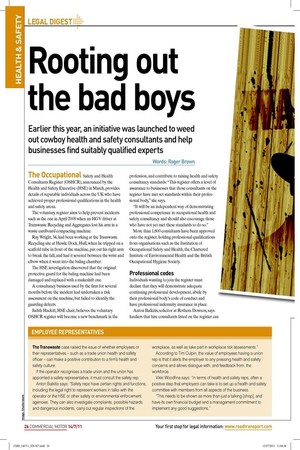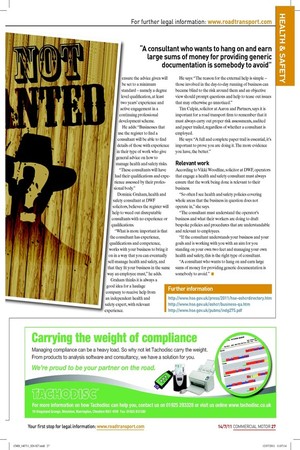Rooting out the bad boys
Page 21

Page 22

If you've noticed an error in this article please click here to report it so we can fix it.
Earlier this year, an initiative was launched to weed out cowboy health and safety consultants and help businesses find suitably qualified experts
Words: Roger Brown The Occupational Safety and Health Consultants Register (OSHCR), announced by the Health and Safety Executive (HSE) in March, provides details of reputable individuals across the UK who have achieved proper professional qualiications in the health and safety arena.
The voluntary register aims to help prevent incidents such as the one in April 2009 when an HGV driver at Transwaste Recycling and Aggregates lost his arm in a waste cardboard compacting machine.
Ray Wright, 34, had been working at the Transwaste Recycling site at Hessle Dock, Hull, when he tripped on a scaffold tube in front of the machine, put out his right arm to break the fall, and had it severed between the wrist and elbow when it went into the baling chamber.
The HSE investigation discovered that the original protective guard for the baling machine had been damaged and replaced with a makeshift one.
A consultancy business used by the irm for several months before the incident had undertaken a risk assessment on the machine, but failed to identify the guarding defects.
Judith Hackitt, HSE chair, believes the voluntary OSHCR register will become a new benchmark in the profession, and contribute to raising health and safety consultancy standards: “This register offers a level of assurance to businesses that those consultants on the register have met set standards within their professional body,” she says.
“It will be an independent way of demonstrating professional competence in occupational health and safety consultancy and should also encourage those who have not yet met these standards to do so.” More than 1,600 consultants have been approved onto the register, holding professional qualiications from organisations such as the Institution of Occupational Safety and Health, the Chartered Institute of Environmental Health and the British Occupational Hygiene Society.
Professional codes
Individuals wanting to join the register must declare that they will demonstrate adequate continuing professional development, abide by their professional body’s code of conduct and have professional indemnity insurance in place.
Anton Balkitis, solicitor at Rothera Dowson, says hauliers that hire consultants listed on the register can ensure the advice given will be set to a minimum standard – namely a degree level qualiication, at least two years’ experience and active engagement in a continuing professional development scheme.
He adds: “Businesses that use the register to ind a consultant will be able to ind details of those with experience in their type of work who give general advice on how to manage health and safety risks. “These consultants will have had their qualiications and experience assessed by their professional body.” Dominic Graham, health and safety consultant at DWF solicitors, believes the register will help to weed out disreputable consultants with no experience or qualiications.
“What is more important is that the consultant has experience, qualiications and competence, works with your business to bring it on in a way that you can eventually self-manage health and safety, and that they it your business in the same way an employee must,” he adds. Graham thinks it is always a good idea for a haulage company to receive help from an independent health and safety expert, with relevant experience. He says: “The reason for the external help is simple – those involved in the day-to-day running of business can became blind to the risk around them and an objective view should prompt questions and help to tease out issues that may otherwise go unnoticed.” Tim Culpin, solicitor at Aaron and Partners, says it is important for a road transport irm to remember that it must always carry out proper risk assessments, audited and paper trailed, regardless of whether a consultant is employed.
He says: “A full and complete paper trail is essential, it’s important to prove you are doing it. The more evidence you have, the better.”
Relevant work
According to Vikki Woodine, solicitor at DWF, operators that engage a health and safety consultant must always ensure that the work being done is relevant to their business.
“So often I see health and safety policies covering whole areas that the business in question does not operate in,” she says.
“The consultant must understand the operator’s business and what their workers are doing to draft bespoke policies and procedures that are understandable and relevant to employees.
“If the consultant understands your business and your goals and is working with you with an aim for you standing on your own two feet and managing your own health and safety, this is the right type of consultant.
“A consultant who wants to hang on and earn large sums of money for providing generic documentation is somebody to avoid.” ■













































